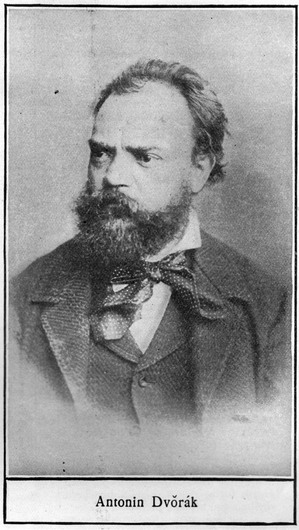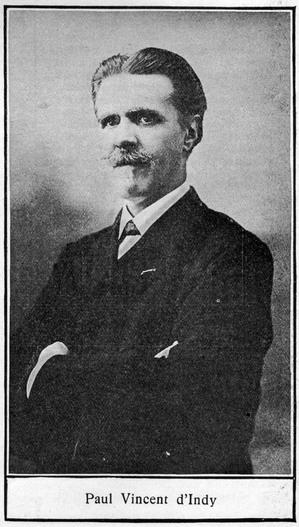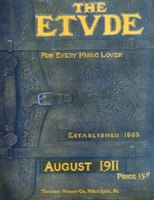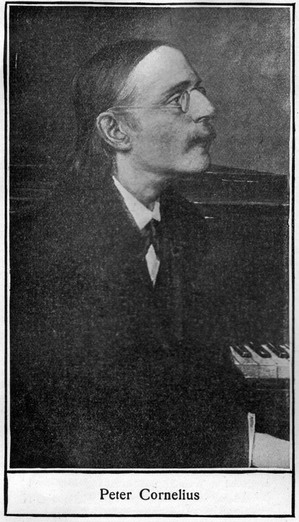 CARL AUGUST PETER CORNELIUS.
CARL AUGUST PETER CORNELIUS.
(Kor-nay’-le-oos.)
Cornelius was born at Mayence, Germany, December 24, 1824, where he died, October 26, 1874. His failure as an actor caused him to turn his attention to music, and though his training was incomplete, he soon acquired a wide general knowledge. After the death of his father, in 1844, he went to Dehn, of Berlin (1845), and studied music thoroughly until 1850. In 1852 he became attached to Liszt’s party at Weimar, and aided in championing the cause of Wagner by his contributions to the Neue Zeitschrift für Musik. In order to elucidate Wagner’s ideas more fully, Cornelius wrote a comic opera. The Barber of Bagdad, which was produced in Weimar, 1858. The failure of this work was the cause of Liszt leaving Weimar. Cornelius also left and went to Vienna, where he met Wagner, with whom he soon became closely allied. When Wagner went to Munich under the patronage of Ludwig II, Cornelius went with him, and was appointed reader to the king. After von Bülow took charge of the conservatory, on its being transformed to the Königliche Musikschule, Cornelius was appointed professor of harmony and rhetoric. His opera the Cid was produced at Weimar in 1865, and he was working on another, Gunlöd, at the time of his death. It was afterwards orchestrated by Hoffbauer and Lassen, and produced at Weimar and Strasburg, 1892. All the works of Cornelius were strongly influenced by Wagner.
Dvořák was born at Mühlhausen, Bohemia, September 8, 1841, and died in Prague, May 1, 1904. His father, an innkeeper, destined him to be a butcher, but music called him into other paths. He studied with his schoolmaster and others. When sixteen he went to Prague and studied organ under Pitzsch, earning his way as best he could by playing the violin in cafés, etc. He got into the orchestra of the National Theatre, and in 1873 became organist at St. Adalbert’s. A patriotic cantata was produced at this time, and the spontaneous national character of Dvořák’s music ensured its success. A government pension was provided from Vienna, and both Liszt and Brahms did much to help him. His Slavische Tanze next attracted wide attention, and other larger works began to obtain a hearing. England welcomed him, and he wrote two or three cantatas, notably The Spectre’s Bride for British festivals. From 1892 to 1895 he was head of the National Conservatory, in New York, and at this time produced the New World symphony. His works included several operas, symphonies, choral and chamber music, besides songs and piano pieces, etc., such as his Humoreske, Valse Gracieuse and the Songs My Mother Taught Me. He was appointed head of the Prague Conservatory after leaving New York. Dvořák was much influenced in composition by the national Bohemian folk-music, greatly loving rich harmonies, unexpected rhythms and brilliant orchestral effects.
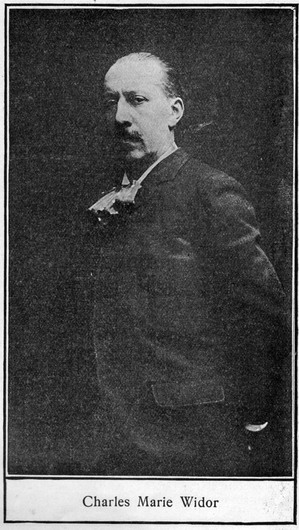 CHARLES MARIE WIDOR.
CHARLES MARIE WIDOR.
(Vee-dor.)
Widor was born at Lyons, France, February 22, 1845, where his father was organist. After study at home he went to Belgium and studied with Clemmens (organ) and Fétis (composition). In 1860 he succeeded his father as organist at the church of St. François. His success here and as an organ recitalist won him the position of organist at St. Sulpice, Paris, in 1869, and he quickly took a leading place among Parisian musicians. He succeeded César Franck as professor of the organ at the Paris Conservatoire, and in 1896 took the place of Dubois as professor of composition there. For many years he acted as critic to a paper called l’Estafette writing under the pen-names of “Aulétès” and “Tibicen.” As a composer he has written a great deal of music of all kinds, and ranks as one of the foremost composers for the organ in recent times. The two collections of “Symphonies” for the organ have attained wide popularity among concert organists, as these works show great mastery of the resources of the modern organ. In addition to the organ music, however, he has written a number of orchestral pieces, including two symphonies and three concertos for piano and orchestra, and a number of songs, piano pieces, etc., besides church music, a ballet and two operas. He has twice visited England, where his organ music is naturally much appreciated. On the latter occasion, 1909, he conducted a concert at the Queen’s Hall, London, entirely composed of his own works.
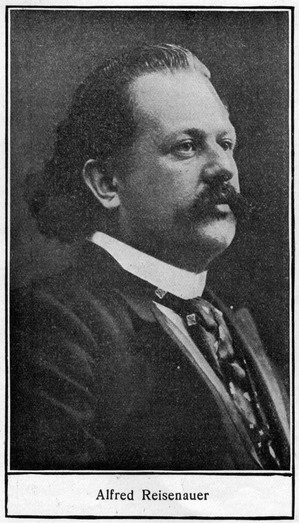 ALFRED REISENAUER.
ALFRED REISENAUER.
(Ry’-sen-ow-er.)
Reisenauer was born at Königsberg, November 1, 1863, and died at Libau, October 31, 1907. He first studied the piano with his mother, who was an exceptionally gifted musician. Later he went to Köhler at the advice of Franz Liszt, who was much impressed by his ability. Subsequently he became a pupil of Liszt, with whom he made his début in 1881. For a time he left the concert stage to study law at Leipsic, but in 1886 he re-appeared with brilliant success. Four years later he became professor of the pianoforte at Leipsic Conservatory. Reisenauer visited the United States for the first time in 1934. He was a great wanderer. It may be said that he was something of a musical pioneer, for he was one of the first great pianists to give recitals in such out-of-the-way places as China, Siberia and central Asia. He had many interesting stories to relate of his appearances at the courts of various Oriental potentates, to whom the visit of a virtuoso was a decided novelty. As a pianist he possessed a great faculty for entering sympathetically into the ideas of the composer whose music he was interpreting. He never sought to astonish his audiences with the brilliance of his technic, but aimed rather to express the meaning of the music. He was at his best, however, when playing the works of Liszt and Schumann.
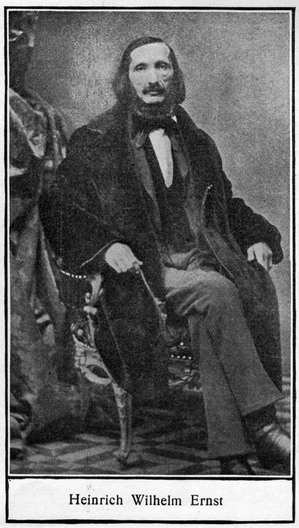 HEINRICH WILHELM ERNST.
HEINRICH WILHELM ERNST.
(Airnst.)
Ernst was born at Brünn, Moravia, May 6, 1814, and died at Nice, October 14, 1865. He studied at the Vienna Conservatory under Seyfried (composition) and Böhm, and later with Mayseder (violin). He first went on tour at the age of sixteen, at a time when Paganini was touring Germany. Ernst was much fascinated by the wizard-virtuoso, and followed him from town to town to get better acquainted with his technic. In 1832 Ernst went to Paris and studied for six years, also appearing in public. From 1838 to 1844 he traveled all over Europe with brilliant success, especially in London, where eventually he settled. As a composer he wrote many salon pieces of a very attractive kind, in which he displayed remarkable grasp of the possibilities of his instrument. The Concerto in F sharp minor however, is a work containing many beautiful ideas, and written with great skill, though it bristles with difficulties. Ernst’s most popular composition is undoubtedly the Élégie, which offers many opportunities to the expert violinist. Ernst was a man of warm, impulsive disposition, and played with great brilliance and fire, though he possessed a beautiful singing tone which was very attractive. He was a musician of solid attainments, and had he lived longer would probably have made many even more valuable additions to violin music than those he has left.
Vincent d’Indy was born in Paris, March 27, 1851. He studied for a while with Diémar and Lavignac, but eventually became a faithful disciple of César Franck, entering his organ class at the Conservatoire in 1873. In 1875 he became a chorus-master under Colonne, and, in order to gain a knowledge of orchestration, played as second drummer in the orchestra. The same year his overture, Piccolimini, was given a hearing, and established his reputation as a composer. He became chorus-master for Lamoureux, and had charge of the chorus at the first Paris performance of Lohengrin. With Franck and others he founded the Societe Nationale de Musique. He was one of the founders of the Schola Cantorum in 1896, and is still its director and professor of composition. In 1905 d’lndy first visited America and conducted a few Boston Symphony concerts. He has composed several symphonies and symphonic poems, the best known of the latter being Wallenstein, Istar and La Forêt enchantée. In addition are several operas, songs, piano pieces and much chamber music and a set of variations for the saxaphone and orchestra. He has contributed to current literature, his study of the life of Franck being especially noticeable. d’lndy has never attempted to pander to popular taste, and has, of course, been charged with “dryness” in consequence. Nevertheless, his supreme mastery of the resources of modern music fully justify the high esteem in which he is held.


